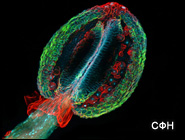Thanks to new achievements of scientists production of genetically identical plants became a step closer.

Using mutations which prevent hashing of genes at sexual reproduction, researchers managed to receive plants which make own genetic clones. Such opportunity - to put evolution on a pause - very much would be useful to selectors and will be demanded by an agricultural industry if becomes rather effective and cheap.
Mutations and a sexual recombination of genes - the evolution engine. But for us it is also important to learn to stop these processes while the result suits us. When crossing of two optimum by any criteria (for example, on flavoring qualities or resistance to frosts) individuals of a look, their posterity will consist also of a set of non-optimal plants. Fault to everything is hashing of genes at sexual reproduction. The new method offered by Raphael Mersyer (Raphael Mercier) and its colleagues, probably, in the future will allow "to stop" variability as soon as it doesn't become necessary.
Scientists described the experiments in the Science magazine. While they managed to turn this trick with a rezukhovidka Talya (Arabidopsis thaliana) - the most popular inhabitant of botanical laboratories. But authors hope that this method will be applicable and to valuable grain crops.
In the 2009th year Mersyer managed to come nearer closely to cloning start at a rezukhovidka. Having united three mutations, scientists managed to stop natural hashing of genes which happens at sexual reproduction. But the success wasn't full: descendants of such plants contained actually doubled genome because of presence of excess chromosomes and ability to reproduction quickly vanished at new generations.
In the new article scientists report that they managed to overcome this illness. They crossed the version of a plant which prevents variability, but gives a double genome with the version (line) of a plant containing a mutation in a gene of CENH3 - which leads to that after fertilization a half of chromosomes perishes. Among descendants of such union a third of plants possessed the necessary properties: hashing of parental genes didn't happen and the quantity of chromosomes was in norm.
Similar technologies while remain purely scientific experiments. But they show that basic restrictions here aren't present and, probably, soon we will be able to stop evolution at own will.
No comments:
Post a Comment